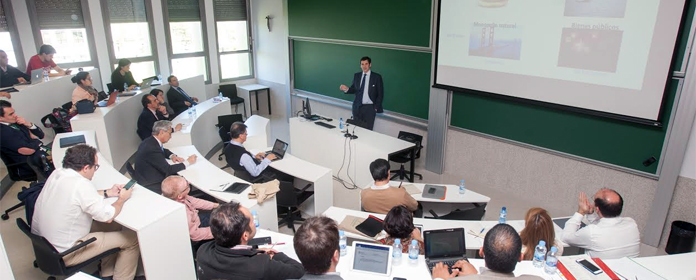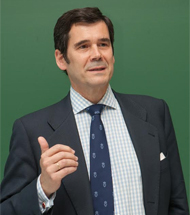Sanz-Magallón: “Externalities are increasingly important because of the key role played by businesses in the global economy”
Director of Institutional Relations at Telefónica participates in 30th anniversary celebrations of Institute for Business and Humanism


José María Sanz-Magallón, Director of Institutional Relations at Telefónica, gave a lecture at the University of Navarra during which he said, “Externalities are increasingly important because of the key role played by businesses in the global economy.” He used Apple as an example and said that if the company’s market capitalization represented GDP, it would be the world’s 20th economy. He went on to say that negative externalities “generate distrust,” so management “is key to ensuring a company's sustainability and is increasingly demanded by society.”
Externalities are private goods whose production or consumption processes affect the public, which generally has nothing to do with such processes. They can be positive (e.g., education and greater skills, floriculture and beauty in the surrounding area) or negative (e.g., pollution and noise).
Sanz-Magallón gave the lecture during Refresher Week, which was organized by the Institute for Business and Humanism Week in advance of the institute’s 30th anniversary. The director said, “Despite the fact that Telefónica is a medium-sized company, it would be the 69th economy in the United Nations if it were a country.”
There are three main types of impact generated by the externalities of businesses: economic, social and environmental. “This is why we need corporate social responsibility. It’s not about philanthropy; rather it’s about reducing negative externalities and increasing the positive ones. We are experiencing a paradigm shift, from externalizing costs to externalizing benefits,” said Sanz-Magallón, who cited the strategic philanthropy of Michael Porter and his notion of “corporate shared value.”
Despite their growing importance in the economy and in society in general, externalities “are difficult to measure: how many people do they affect and how are intangibles such as human lives and clean air measured? We need a mechanism like the market. Without this, valuations are implied and often disputed,” the expert admitted.
For example, he stated that some US companies have valued a human life at around 10 million dollars. “How did they come up with that number? Well, I guess there will be people willing to run a 10% risk of death for 100 million dollars.” Although this calculation may seem appalling, or perhaps precisely because of that, the expert insisted that a value should be put on externalities. “They are especially important today: we are the first generation with the power to change the planet’s climate, but the last generation that will not suffer the consequences,” he said, referring to Pope Francisco’s encyclical Laudato si' to back up his argument.
The future is big dataSanz-Magallón concluded his speech by saying that big data, i.e., large amounts of cross-referenced data on human behavior, “is the oil of the 21st century. And who owns that oil? Well, we see it in the world of the Internet. If the product is free, then you are the product,” said Sanz-Magallón, who said that Movistar “makes money through its telecommunications services, so does not need to trade with its clients’ data. That’s why we want to give clients the opportunity to manage their data scattered around the world.”
